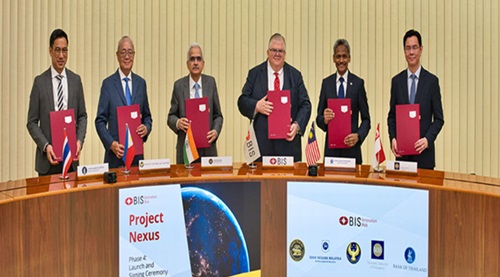
- Project Nexus is a multilateral initiative conceptualized by the Bank for International Settlements (BIS) to facilitate instant cross-border retail payments by interlinking domestic Instant Payment Systems (IPS).
- This project aims to enhance the efficiency, speed, and cost-effectiveness of cross-border transactions, aligning with the G20's objectives of improving global payment systems.
Institutional Background
Bank for International Settlements (BIS):
- Established in 1930, headquartered in Basel, Switzerland.
- Owned by 63 central banks, including the Reserve Bank of India (RBI).
- Functions as the "bank for central banks," fostering monetary and financial stability globally.
Innovation Hub of BIS:
- Responsible for conceptualizing and developing Project Nexus.
- Collaborates with central banks and financial institutions to implement innovative financial solutions.
What is an Instant Payment System (IPS)?
An IPS is an electronic payment system that:
- Facilitates inter-bank fund transfers.
- Provides payment confirmation to both sender and receiver within one minute or less.
- Operates 24/7, ensuring continuous availability.
- Example: Unified Payments Interface (UPI) in India.
Participating Countries and Expected Timeline
Founding Members:
- India (via UPI)
- Malaysia
- Philippines
- Singapore
- Thailand
Special Observer:
- Indonesia
- Expected Go-Live: By 2026
Objectives of Project Nexus
- Enhance Cross-Border Payments: Enable instant, low-cost, and transparent transactions across borders.
- Standardize Connectivity: Establish a unified framework for connecting various IPS, reducing the need for bilateral agreements.
- Promote Financial Inclusion: Provide accessible payment solutions to a broader population, including underserved regions.
- Align with G20 Goals: Support the G20's roadmap to improve the cost, speed, access, and transparency of cross-border payments.
Operational Framework
Nexus Scheme Organisation (NSO):
- Established to manage the operational aspects of Project Nexus.
- Oversees the implementation and governance of the interconnected IPS.
Technical Specifications:
- Utilizes ISO 20022 messaging standards for interoperability.
- Develops API specifications to facilitate seamless integration between different IPS.
Governance Model:
- Ensures compliance with international standards.
- Accommodates regulatory differences among participating countries while maintaining efficiency and resilience.
Significance for India
- Global Leadership: Positions India as a leader in digital payment infrastructure.
- Economic Integration: Strengthens economic ties with ASEAN countries through enhanced financial connectivity.
- Financial Inclusion: Expands access to digital payment systems for a larger population.
- Strategic Influence: Enhances India's influence in shaping global financial systems and standards.


